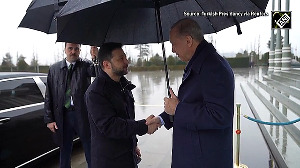Thirty-seven Nobel laureates on Wednesday signed a letter by the Federation of American Scientists to the United States Congress exhorting lawmakers to oppose the Indo-US civilian nuclear agreement.
The laureates, spanning the spectrum of physics, medicine, economics and chemistry, urged the lawmakers to vote against the legislation that will envisage the consummation of the deal.
The laureates said in its missive that 'nothing is more important to US security than blocking further proliferation and possible use of nuclear weapons'.
They argued that the nuclear deal 'weakens the existing nonproliferation regime without providing an acceptable substitute' and thus 'it should not be approved in its current form.'
- Complete Coverage: The Indo-US Nuclear Tango
The FAS letter acknowledged that 'the Non-Proliferation Treaty -- the backbone of international efforts to step the spread of nuclear weapon technology -- is crumbling and needs to be replaced with a new international framework, one that reflects dramatic changes that have occurred during the 30 years since the treaty was written'.
But they argued that 'new agreements must preserve the many strengths of the current treaty and increase international participation'.
They warned that 'bilateral, ad-hoc agreements such as the one just announced with India undercut US and world security'.
The signatories declared, 'We strongly endorse actions that can build stronger ties between India and the United States in trade and research and we believe that worldwide expansion of civilian nuclear power has the potential to provide electricity without increasing carbon emissions to the atmosphere'.
But they informed the lawmakers that 'rapid growth of civilian nuclear power will, however, greatly increase both the amount of fissionable material transported and stored worldwide, and the number of nuclear fuel production facilities that can be used to build nuclear weapons'.
Atomic scientists from the Manhattan Project formed the Federation of American Scientists in 1945 to encourage international openness and control of nuclear industry.
Two Indians -- Kumar Patel and Shankar Sastry are on its board of directors.






 © 2025
© 2025